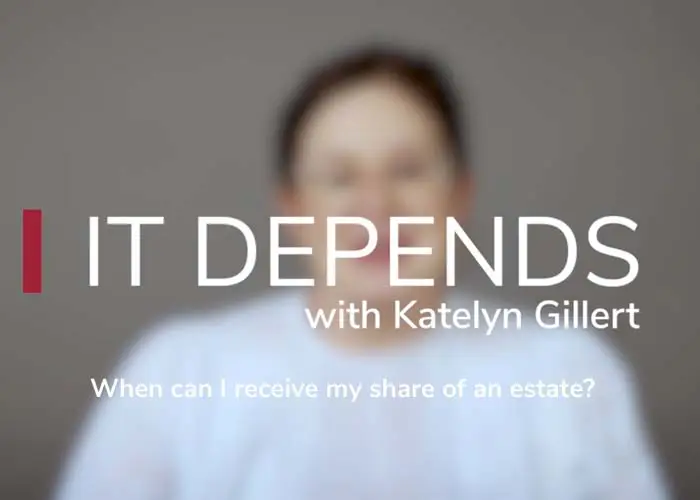Authored by: David Grace and Stephanie Gibbons
In a recent decision, the High Court of Australia considered the nature of an ‘understanding’ for the purposes of the restrictive trade practices provisions within Part IV of the Competition ...

In this edition of It depends, associate Katelyn Gillert discusses when you can receive your share of an estate.
Welcome to this installment of It depends. Today I will be discussing when you can receive your share of an estate and as always, the answer to that is it depends.
When we are talking about estates, we are talking about a deceased estate. That is all of the assets that a deceased person owned in their sole personal name at the date of their death.
It depends, and it can depend on a number of things. As a starting point, if there is a Will, the executor will need to look to the Will to determine who exactly is entitled to a share of the estate and in what proportions they are entitled to. If there is no Will, then it will be an administrator looking to the legislation to determine who is entitled to a share of an estate and again, in what proportions. Determining what proportion someone is entitled from an estate is another question completely, and that will depend on the value of the assets of the estate less any liabilities that need to be paid. It can often take some time to identify what those assets might be, to call them in and to realise them, and that could be because perhaps they are complicated assets, or maybe they are located interstate or overseas.
Again, it depends. The time it takes to administer an estate will depend on the complexity of the assets and the complexity of any issues that arise along the way. One of the most important considerations for an executor or administrator if there is no Will, when deciding when and whether to make a distribution from an estate are the family provision application timeframes. In Queensland, a person who’s wishing to make these kinds of claims, they have six months from the date someone’s death to give notice to the executor of an intention. They then have a further three months after that to make their application in the court. Generally speaking, an executor or administrator would be recommended to not distribute an estate prior to the expiry of that six-month timeframe, and on the basis that they receive no notification of an intention to make the claim.
Family provision application considerations are not the only thing that may delay the administration of a deceased estate. Other things could be finalising tax matters for the deceased and for the estate. It could be gaining access to assets that have timeframes on them. It could include things like waiting to term deposits to mature, or for gaining access to assets that are overseas or interstate. Sometimes an interim distribution can be made from a deceased estate, but again, that will depend largely on the things that we have just discussed today.
Thank you for listening to this installment of It depends. As always, if you have any questions about your entitlement to a deceased estate, please get in contact with our estates team.
This publication is for information only and is not legal advice. You should obtain advice that is specific to your circumstances and not rely on this publication as legal advice. If there are any issues you would like us to advise you on arising from this publication, please let us know.
Subscribe to our interest lists to receive legal alerts, articles, event invitations and offers.

Cooper Grace Ward acknowledges and pays respect to the past, present and future Traditional Custodians and Elders of this nation and the continuation of cultural, spiritual and educational practices of Aboriginal and Torres Strait Islander peoples.
Fast, accurate and flexible entities including companies, self-managed superannuation funds and trusts.